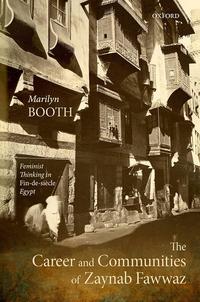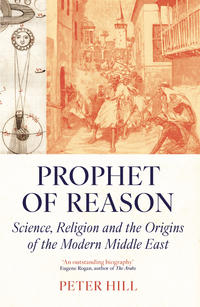Panel Event: Telling Middle Eastern Lives
This is a free event that is open to all.
Registration is recommended (required for hybrid attendance). This event will be recorded and will be made available soon after.
Telling Middle Eastern Lives
A Panel Event with Professor Marilyn Booth, Professor Sonja Mejcher-Atassi, and Professor Peter Hill
In this hybrid event, Professor Marilyn Booth (University of Oxford) will lead a conversation with Professor Sonja Mejcher-Atassi ( American University of Beirut) and Dr Peter Hill (Northumbria University) on the value of life-writing as an approach to Middle Eastern history and literature. They will ask:
What are the rewards, and what are the challenges, of trying to tell the stories of individual Middle Eastern lives?
The discussion will draw on the three speakers' recent books, which all use biography in different ways:

Marilyn Booth, The Career and Communities of Zaynab Fawwaz: Feminist Thinking in Fin-de-siècle Egypt (2021)
Booth examines the life and intellectual contributions of Zaynab Fawwaz, a pioneering feminist in late 19th-century Egypt. Booth’s biography of Fawwaz blends historical analysis with feminist theory, using Fawwaz’s life as a lens to explore issues such as women’s rights, marriage, education, and social justice in the Arab world. Booth also investigates how Fawwaz’s work in literature, journalism, and theatre challenged patriarchal norms, illustrating how biography can highlight gendered struggles within broader social and political movements.

Sonja Mejcher-Atassi, An Impossible Friendship: Group Portrait, Jerusalem Before and After 1948 (2024)
Mejcher-Atassi examines the intertwined lives of a group of intellectuals, artists, and writers in Jerusalem during and after World War II. Through this collective biography, Mejcher-Atassi examines how personal stories reflect the's larger political and social upheavals, especially around the formation of Israel and the Nakba. Her approach is focused on the personal dimensions of history—how intimate relationships and intellectual exchanges can provide new perspectives on conflict and solidarity. Her biography of this group of friends is a way of reconstructing a lost social and cultural world while shedding light on broader historical events.

Peter Hill, Prophet of Reason: Science, Religion and the Origins of the Modern Middle East (2024)
By tracing the life of Mikha’il Mishaqa, a Lebanese intellectual, Hill explores the intersection of science, religion, and modernity in the Arab world. Mishaqa’s life, marked by dramatic personal and intellectual shifts—from rejecting Catholicism to embracing Protestantism—serves as a window into the era’s intellectual currents and religious upheavals. By tracing Mishaqa’s life through this tumultuous era, when empires jostled for control, Hill answers the question: What did people in the Middle East actually believe?
About the Speakers:
Professor Marilyn Booth
Marilyn Booth is Emerita Al Saud Professor for the Study of the Contemporary Arab World at the University of Oxford. Her research focuses on 19th-century Arabophone women’s writing, gender ideologies, and feminist history. She is the author of The Career and Communities of Zaynab Fawwaz (2021) and Classes of Ladies of Cloistered Spaces (2015), both of which explore the lives of influential women in fin-de-siècle Egypt. Booth is also a renowned translator, having won the 2019 Man Booker International Prize for her translation of Jokha Alharthi’s Celestial Bodies.
Professor Sonja Mejcher-Atassi
Sonja Mejcher-Atassi is a Professor of Arabic and Comparative Literature at the American University of Beirut. She specializes in modern Arabic literature, art, and cultural history. Her recent book, An Impossible Friendship: Group Portrait, Jerusalem Before and After 1948 (2024), explores the lives of a group of intellectuals and artists in Jerusalem during the postwar period. Mejcher-Atassi has authored multiple works on modern Arab literature and art and is the co-editor of The Theatre of Sa’dallah Wannous (2021) and other scholarly volumes on Arab cultural history.
Professor Peter Hill
Peter Hill is an Associate Professor of History at Northumbria University, specializing in 19th-century Arab history, political thought, and religion. He is the author of Utopia and Civilisation in the Arab Nahda (2020) and Prophet of Reason: Science, Religion, and the Origins of the Modern Middle East (2024). Hill's research examines the intellectual and political transformations of the Arab world, with a particular focus on the intersections of science, religion, and modernity. He was awarded a Philip Leverhulme Prize in History in 2023.
This is a free event that is open to all.
Registration is recommended (required for hybrid attendance). This event will be recorded and will be made available soon after.
Event Contacts and Queries:
Queries regarding this event should be addressed to OCLW Events Manager, Dr Eleri Anona Watson.





